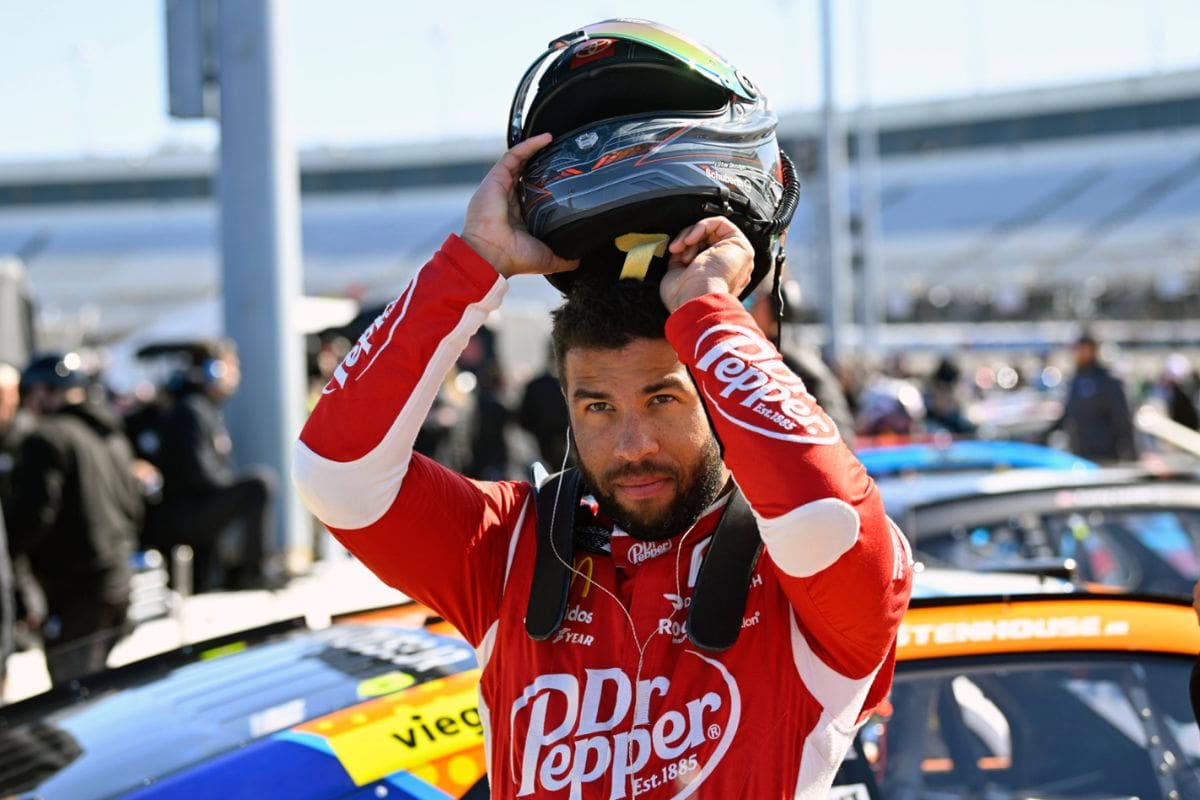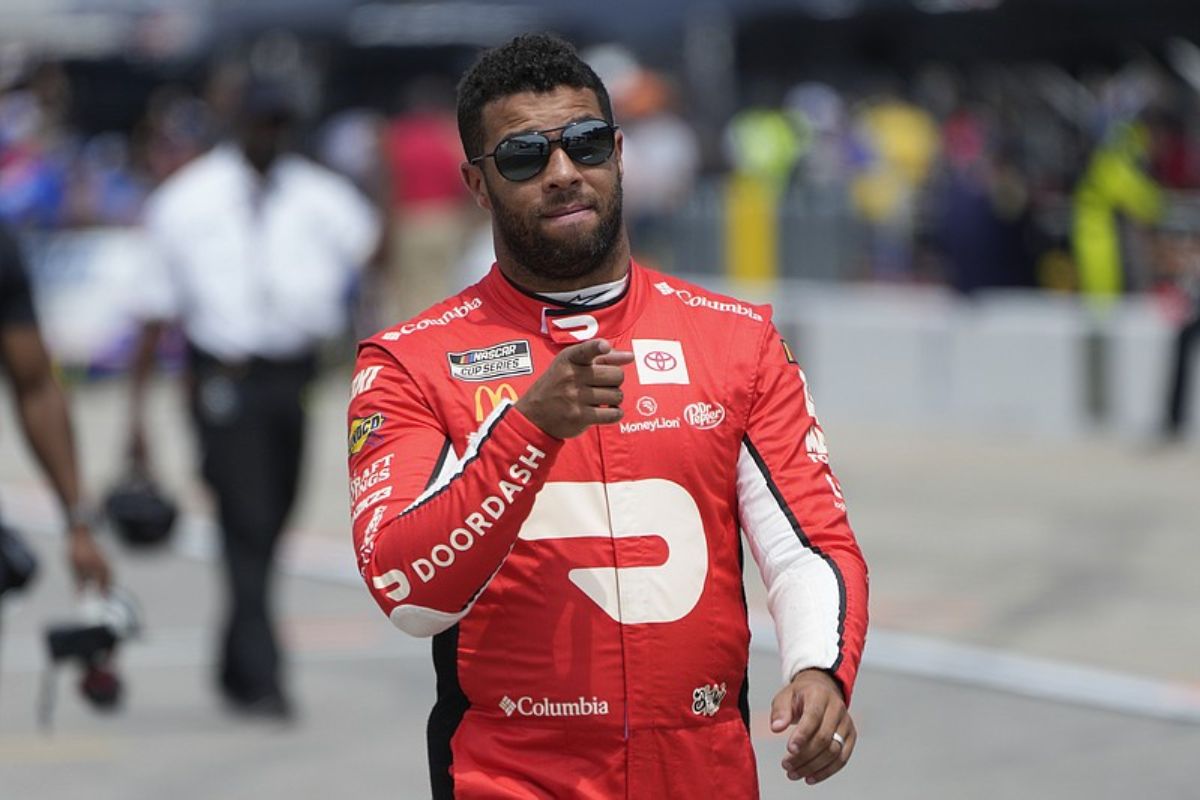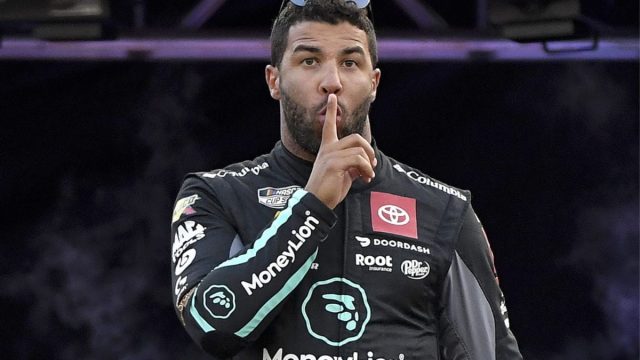Fans Criticize Bubba Wallace’s Spotter: The debate surrounding Bubba Wallace’s spotter, Freddie Kraft, and his part in an April Fools’ prank, emphasizes Denny Hamlin’s controversial restart in Toyota Owners 400 at Richmond Raceway. NASCAR fans expressed mixed reactions, with some seeing the humor while others questioned the sport’s integrity. This incident highlights the fine line public figures must navigate when engaging in jest, balancing camaraderie and professionalism. With NASCAR’s Elton Sawyer confirming and explaining the controversial restart, the discussion evolved toward how officiating transparency and consistency are essential. Understanding the complexity of these situations can enhance appreciation for the strategic and regulatory aspects of racing.
Key Takeaways
- Bubba Wallace’s spotter, Freddie Kraft, participated in an April Fool’s joke relating to Denny Hamlin’s controversial restart at Richmond.
- The jest was part of a broader attempt by NASCAR personalities to diffuse tension with humor following the controversy.
- Fans’ reactions to the prank were mixed, with some appreciating the light-hearted attempt and others expressing skepticism about its impact on the sport’s integrity.
- The incident and subsequent April Fool’s prank underscored the NASCAR community’s nuanced expectations around transparency and integrity.
- NASCAR officials, including Elton Sawyer, have addressed the controversy, highlighting ongoing discussions about officiating consistency and transparency.
Denny Hamlin’s Controversial Restart at Richmond
The controversial restart by Denny Hamlin at Richmond Raceway ignited significant debate among NASCAR enthusiasts, raising questions about the integrity of racing protocols. This incident, marked by allegations that Hamlin jumped the restart zone, disrupted the flow of what had been a dominant performance by Martin Truex Jr., fundamentally altering the competitive landscape of the race. The late caution, which presented Hamlin with an essential advantage, became a critical moment, sparking widespread scrutiny and discussion within the NASCAR community.
The intricacies of the restart zone rules, designed to guarantee a level playing field and prevent any driver from gaining an undue advantage, are central to the controversy. NASCAR’s regulations stipulate precise boundaries within which drivers must maintain their positions until the race officially resumes. The allegation that Hamlin violated these rules by prematurely accelerating has not only cast a shadow over his move but also prompted a broader conversation about the enforcement and clarity of NASCAR’s restart policies.
Analyzing the incident requires a nuanced understanding of the interplay between race strategy, driver skill, and regulatory adherence. The restart zone, a critical aspect of race strategy, demands precise timing and control from the drivers. Hamlin’s actions, whether viewed as a tactical edge or a breach of regulations, highlight the thin line between competitive advantage and rule infringement in the high-stakes environment of NASCAR racing. This episode serves as a case study in the complexities of motorsport regulation and the ongoing challenge of balancing competitive integrity with the unpredictable dynamics of racing.

Hamlin Addresses the Controversy
Following the heated debates surrounding Denny Hamlin’s controversial restart at Richmond, Hamlin himself took to his podcast to openly discuss the tactics he employed during the race. In a move that showcases his willingness to engage with controversy head-on, Hamlin acknowledged the rushed tactics that had sparked extensive discussion within the racing community. This candid admission serves as a rare glimpse into the mindset of a professional driver in high-stakes situations, providing invaluable insights into the split-second decisions that define the outcomes of races.
Hamlin’s approach to addressing the controversy was not devoid of a lighter touch. In a surprising twist, he injected humor into the situation by jokingly admitting fault on April Fool’s Day. This move not only demonstrated Hamlin’s ability to navigate the fine line between accountability and levity but also highlighted his savvy in diffusing tension through well-timed humor. It’s a strategy that not only endeared him to fans but also illuminated the complex dynamics of public relations in the high-pressure world of professional sports.
Adding another layer to the unfolding narrative, Bubba Wallace’s spotter, Freddie Kraft, contributed to the jest with his own comments. This collaborative banter between Hamlin and Kraft further enriched the discourse, showcasing a camaraderie that often goes unseen behind the competitive veneer of the sport. Through their interactions, both figures managed to turn a potentially divisive incident into a moment of communal entertainment, showing the multifaceted nature of controversies in the public eye and the nuanced ways in which they can be navigated.
The comment from Freddy Kraft which started the banter “Uh, no, he definitely jumped the start. It was pretty obvious watching it live and then going back to see the replays…I don’t think this is over yet. I think that there might be some interesting news coming out tomorrow in the penalty reports about this.” ( Freddy kraft )
Fan Reactions to the April Fool’s Jokes
NASCAR fans displayed a range of reactions, from bemusement to skepticism, in response to the April Fool’s Day jokes shared by Hamlin and Kraft. The diversity in fan response highlights the complex relationship between sports personalities and their audiences, especially in the digital age where the line between humor and misinformation can blur rapidly. Some fans expressed frustration, feeling that the pranks, while meant in jest, could propagate confusion and potentially detract from the sport’s integrity.
This sentiment emphasizes a broader expectation among fans for transparency and authenticity from figures within the racing community. The widespread reaction to the online prank included comments from fans. One fan cautiously responded, “I believe absolutely nothing posted on April 1st”. Another fan flat-out stated, “The internet ruined April fools day. Everything is so stupid now”.
A few others sharply criticized the prank and the individuals who were a part of it, “Some people man. Put themselves in such a rush to post it here, for the fake internet points of all things, just for it to be fake lol. On April Fools of all days”. Another fan publicly bashed Bubba Wallace’s team, “I wish #23 pit crew was a April fool joke”.
Conversely, a segment of the audience found humor in the situation, appreciating the light-hearted attempt to engage fans outside the high-stakes environment of racing. This dichotomy in reception illustrates the subjective nature of humor, particularly in the context of professional sports, where fans often have deeply vested emotional connections.
Analyzing the fan reactions reveals a nuanced landscape of expectations and permissible behavior within the NASCAR community. It points to the broader dynamics at play in fan-celebrity interactions in the age of social media, where a joke can quickly become a litmus test for a public figure’s relationship with their audience.

NASCAR’s Confirmation and Insights
Amid the mixed reactions to April Fool’s Day jokes, a statement from a NASCAR official sheds light on the recent controversy surrounding Hamlin’s early restart. Elton Sawyer, NASCAR’s senior vice president of competition, has come forward to confirm the incident. which has sparked widespread discussion among fans and insiders equally. This acknowledgment is pivotal, as it brings an air of official recognition to the debates that have clouded social media and forums post-race.
Sawyer’s explanation explores the intricacies of overseeing such incidents in real-time. The challenge lies not only in the rapid pace at which decisions must be made but also in the nuances of each situation. In Hamlin’s case, his leading position at the time of the early restart was a significant factor in the judgment call made by officials. This aspect of the decision-making process highlights the intricate balance between strict rule enforcement and the fluid nature of racing dynamics.
Furthermore, Sawyer’s insights suggest a broader conversation about the mechanisms of oversight in NASCAR races. While the confirmation of Hamlin’s early restart may close one chapter of the debate, it simultaneously opens another on the transparency and consistency of officiating decisions. Critics of Hamlin, armed with this official acknowledgment, continue to voice their concerns over perceived inconsistencies in how rules are applied, particularly in high-stakes situations.
This ongoing controversy highlights the delicate interplay between the art of racing and the science of regulation, a balance NASCAR officials like Sawyer are tasked with maintaining. As the dust settles on this particular incident, the broader implications for race governance and fairness remain at the forefront of discussions among stakeholders.
Elton Sawyer conceded that Denny did have an early start when he commented “there’s no doubt (Hamlin) rolled early”. “It’s a bang-bang call,” he said. “It’s at the end of the race. We’re a live sporting event. We don’t have the luxury of a timeout and go to the sideline and review it and make that call. ”Sawyer also observed that Hamlin’s leading position also cleared him of foul play. “Because he was the leader, he did get some of that benefit. If he’s not the leader, then it’s a whole different conversation that we’re having.” ( elton sawyer )
Continued Frustration and Fallout
Despite Elton Sawyer’s clarifications, the discontent within the NASCAR community regarding Hamlin’s controversial win at Richmond continues to simmer, showing deeper issues of trust and consistency in race officiating. This ongoing frustration among fans and stakeholders highlights a chasm between the expectations for fairness and the perceived realities of race management. The incident has not only sparked debates across platforms but has also illuminated the broader challenges that NASCAR faces in maintaining transparency and credibility in its decisions.
The table below outlines key facets of the ongoing debate:
| Aspect | Community Sentiment | Implications for NASCAR |
|---|---|---|
| Trust | Eroded by perceived inconsistencies | Need for enhanced transparency and clear communication |
| Consistency | Calls for uniform application of rules | Potential overhaul of officiating processes |
| Fan Engagement | Frustration could lead to disengagement | Importance of addressing concerns to retain fan base |
In an analytical viewpoint, the persistence of such controversies suggests that NASCAR is at a critical juncture. To navigate through these troubled waters, it must not only reassess its officiating protocols but also invest in rebuilding trust with its audience. This involves not just rectifying perceived inconsistencies but also engaging in a more open dialogue with fans and teams both.

News in Brief
The controversy surrounding Bubba Wallace’s spotter and the events at Richmond, especially the questioned restart by Denny Hamlin, elicited a wide range of reactions from fans and stakeholders.
While some viewed the incident as an April Fool’s jest, others expressed significant frustration, highlighting the fine line between humor and professionalism in sports.
NASCAR’s involvement provided clarity, yet the incident emphasized the complexities of managing perceptions and emotions in a highly competitive environment, reflecting on the broader challenges within professional racing circuits.
Our Reader’s Queries
Q: Who is Bubba Wallace spotter?
A: 23XI Racing’s driver, Bubba Wallace, recently commended his spotter, Freddie Kraft, for his valuable insights during NASCAR Cup Series races.
Q: What is Bubba Wallace’s real name?
A: Born on October 8, 1993, William Darrell “Bubba” Wallace Jr. initiated his racing journey at the age of 9, venturing into the Bandolero and Legends car racing series, aimed at nurturing young talents in motorsports.
Q: Has Bubba Wallace ever won?
A: A product of the NASCAR Drive for Diversity program, Bubba gained prominence in 2013 as the first African-American in half a century to secure victory in one of NASCAR’s three national series, the Truck Series. This marked the onset of his six NASCAR Truck Series triumphs.
Also Read: Bubba Wallace’s Controversial Moments: NASCAR’s Drama Unleashed

